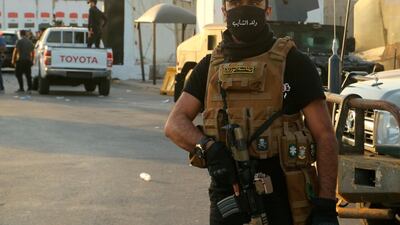It takes a bold judge to sign a warrant for the arrest of a commander of Iraq's Popular Mobilisation Forces, the network of Iran-backed militias that dominates large swathes of the country. But the warrant that led to the arrest on Wednesday of Qassem Musleh, head of PMF operations in Anbar, on charges of terrorism reportedly related to the murders of several prominent activists, is not an exercise in judicial adventurism. It is the product of a week-long investigation and months of tensions over the activists' killings. It is also an effort to rectify Iraq's longstanding inability to rein in the militias accused of targeting them.
Since the start of a popular protest movement in October 2019 calling for an end to foreign meddling in Iraq, the murder of civilian political activists has become a widespread phenomenon. Dozens have been gunned down – primarily, many suspect, by the foreign-sponsored militia groups they are rallying against.
Each killing has only unleashed further rounds of protest, and the escalation has drawn in Iraq's national security forces, who nominally oversee the militias but in reality have no control over them. On Tuesday, as hundreds gathered in Baghdad's Tahrir Square to demand justice, security forces opened fire, killing at least two protesters and injuring many more.
The judiciary’s decision to pursue Mr Musleh, who has a string of murder allegations by civil society groups trailing behind him, is an attempt on the part of the central government to show that it is ultimately on the side of the people. The investigation into Mr Musleh is endorsed by Iraq’s Prime Minister, Mustafa Al Kadhimi, who has been at pains since his appointment a year ago to reassert the government's monopoly over the use of force and diminish the power of the foreign-backed militias.

Mr Al Kadhimi has his work cut out for him. Although he refers to some of the militias – without naming them specifically – as “outlaws”, their existence has been codified into Iraqi law since 2016, according them a status similar to that of the national army. Trying to navigate an economic crisis, the Covid-19 pandemic, the winding down of US troops and the incessant meddling of Iran all in his first year in office, Mr Al Kadhimi has not yet garnered the political capital needed to legislate the PMF away or consolidate his control over them – let alone take them on militarily.
Last June, the same unit that detained Mr Musleh arrested 14 members of the Iran-backed PMF group Kataib Hezbollah. After the militia threatened a standoff, the central government relented, releasing the militiamen within days. A week later, Hisham Al Hashimi, a prominent security researcher and author, was shot to death outside his home in Baghdad. Kataib Hezbollah, a group Al Hashimi researched, is widely suspected to be behind the killing, but to this day no suspect has been arrested.
Until Baghdad is able to hold militias to account, protesters will have good reason to remain angry. Shortly after Mr Musleh’s arrest, Jeanine Hennis-Plaeschert, the UN envoy to Iraq, tweeted that “any arrest case should run its course” and that “a show of force” by armed groups to “get their way” only “weakens the Iraqi state and further erodes public trust”. Her statement echoes what many inside and outside Iraq are thinking: that Baghdad is being tested once again. If it wants to break the cycle of violence and impunity the militias have started, it must not buckle.


